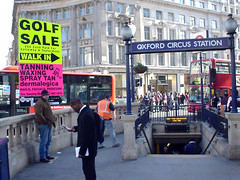Once again, BBC2 comedy hits the nail on the head with its assessment of the media:
Wednesday, 23 July 2008
Sunday, 20 July 2008
How 'fair' should Fairtrade go?
A couple of things have recently prompted me to ask this question. Firstly, seeing press adverts for Fairtrade Cotton T Shirts being sold by Sainsburys for £3 (M&S have been doing them for a fiver for a while now), my thought process went as follows:
1. Yay! Mainstream use of Fairtrade cotton!
2. Ooh, and low prices meaning it's commercially competitive, whilst still retaining ethical business practice.
3. Hang on, they only say that the cotton is Fairtrade. How are these made so cheaply?
Now, as anyone who watched Blood, Sweat and T Shirts can attest, the cotton harvesting and garment-making industries are two very separate enterprises, both of which can involve huge exploitation and unfair employment conditions. So it is entirely possible that a company could use certified Fairtrade cotton to make garments in sweat shops. I'm not saying that's the case here (especially as t shirts are so simple that they might only cost pence to make even at a fair price) and I shall endeavour to find out for sure. But it did make me aware of the risk of falling for potential pseudo-greenwashing; just because part of a process has been certified to be sound cannot guarantee the rest of it.
Onto my second issue: even when the wages are fair, is our 'work' as responsible consumers finished? So, the roof is sound and the water is clean, but what about other aspects of the working environment? American Apparel is a company that boasts good working conditions - its clothes are made exclusively in LA, by a fairly waged workforce predominantly made up of migrants who might otherwise be forced into lower paid work that doesn't provide the same healthcare benefits and union membership etc. All fine thus far.
But is there a dark side, after all. A while back, perusing AA's website, it did strike me that the way that some of the clothes were presented seemed to cross that line from 'sexy' to 'sleazy'. In the end, I put it down to perhaps me being an unfashionable prude, who didn't 'get' the art of couture. But it seems there might have been something in my instincts. There have been reports about the conduct of AA's CEO, Dov Charney. Several lawsuits have been filed against him, by his employees, for sexual harassment. Admittedly, none have led to an in-court settlement, but there seem to be quite a range of reports suggesting that Mr Charney is less than keen on keeping business and pleasure separate. Given that working for him is probably the only decent employment opportunity for many of his workforce, one might ask whether it is really fair for them to be subjected to such a working environment. What's an ethical consumer to do?
Posted by
Ginger
at
16:59
2
comments
![]()
Labels: employment, ethical consumerism, Fair Trade, Fairtrade, fashion, industry, social justice
Saturday, 12 July 2008
Club Sandwich(board)
The great big fluorescent 'Golf Sale' sign could be a thing of the past. At least if Westminster Council get their way. There is a plan afoot to ban them from the West End, and fine offending companies up to £2500 for non-compliance. The Council argue that not only are they an eyesore, they also make life difficult for pedestrians.
Ok, so they're a bit shabby, but I'm not sure I agree with the latter. Cutting through Covent Garden, yes, there are a few advertising cheap theatre tickets that one might have to navigate around, but far more tricky are (i) tourists (ii) people pretending to be statues and (iii) the hoards of people who erroneously thing that outside Covent Garden tube station is a good place to meet (been there, done that). Heck, they even serve a purpose - one helped me find a DM stockist on Garrick Street when Covent Garden was without one for a while. And that's, like, totally crucial information. ;-)
Actually, if Westminster Council want to ban things that make one's transit from A to B on foot problematic, may I suggest targeting the following as a greater priority:
- People proffering The London Paper and London Lite
- Chuggers
- The Scientologists on Tottenham Court Road who try to lure you in by offering a stress test (presumably to detect how stressed they've made you by getting in your way)
- People who stop at the top of escalators to plan their next move, oblivious to the pile-up behind them.
- Loved-up couples who think that meandering along, holding hands, is acceptable behaviour on Oxford Street/in mainline stations during rush hour.
- Users of those suitcases with extendable handles, who ignore the existence of everyone else, to leave a trail of chipped ankle bones in their wake.
- Cars
- Groups of 50+ exchange students who manage to block off entire chunks of pavement at a time
- Stationary rickshaws
- Boris Johnson. (Oh alright, maybe this isn't his fault. But I've got to try...)
I mean, lets look at the positives: at least a great big placard is more environmentally friendly than a load of fliers. And if you were feeling desperate for a cut-price nine iron, then they could serve you very well.
All this does remind me of a question I have pondered before. What exactly is it about golf that prompts this kind of advertising, far more than the sale the any other product? Do people who play golf respond well to that kind of thing? Whatever the answer is, I hope that the people who were probably employed on a sub-minimum wage to do this manage to find other work. Or else there might be a protest. With neon placards.
Posted by
Ginger
at
00:13
5
comments
![]()
Labels: advertising, grump, London
